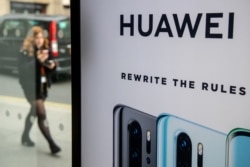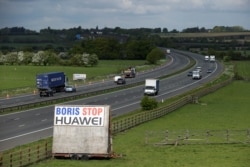Fears are mounting in Britain about possible Chinese government retaliation in the wake of an expected announcement Tuesday blocking Chinese tech giant Huawei from playing any role in the development of Britain’s next generation 5G phone network.
British leaders worry their country may become the target of a possible cyberattack similar to one that hit Australia last month and that Australian government agencies suspect was sponsored by Beijing.
Britain’s culture minister, Oliver Dowden, is expected to announce in the House of Commons Tuesday that Huawei is to be denied any 5G role.
Banning Huawei, a flagship Chinese telecom company, will mark a sharp policy reversal and likely worsen the deteriorating relations between the two countries. Chinese officials, including Beijing’s ambassador to Britain, Liu Xiaoming, have underscored for weeks that there will be repercussions in the event Huawei is excluded.
In recent weeks, tensions between London and Beijing have been escalating quickly over a Chinese security clampdown on Hong Kong, a former British colony transferred to China in 1997. To Beijing’s anger, Britain announced Hong Kong residents would be allowed to move to Britain to escape the crackdown. The two governments have clashed also over Britain’s backing of an independent probe into the origins of the coronavirus.
In January, Prime Minister Boris Johnson decided to allow Huawei a role in the development of the fast-speed network, but limited the company’s participation to just 35%. Since that decision, U.S. officials — as well as other Western allies — have continued to lobby London to block Huawei altogether. U.S. officials say there is a significant risk that the company, which has close ties to the Chinese intelligence services and was founded by a former Chinese army officer, will act as a Trojan horse for Beijing's espionage agencies, allowing them to sweep up data.
Huawei has denied the claim and accused the United States of seeking to boost the market position of American companies. Earlier this month, a Huawei spokesman said, “Huawei is the most scrutinized vendor in the world and we firmly believe our unrivaled transparency in the UK means we can continue to be trusted to play a part in Britain’s gigabit upgrade.”
Dowden is expected to set a deadline of 2025 for removing any Huawei equipment already installed in the developing network — despite complaints from British telecom companies about the high costs involved.
Possible cyberattack
As the announcement looms, British officials say they are bracing for a fierce Chinese government reaction, with some suggesting a cyberattack will be the most likely form of retaliation. Britain’s National Cyber Security Center says it is not anticipating a hacking attack, but a senior minister told a British newspaper the possibility has been discussed in Downing Street.
According to press reports, Australian Prime Minister Scott Morrison briefed Johnson on a massive cyberattack Morrison says was launched on his country last month. The incident, say Australian officials, targeted “government, industry, political organizations, education, health, essential service providers and operators of other critical infrastructure.”
Australia and China’s communist government have been at loggerheads since Australia became the first nation to call for an international inquiry into the origins of the coronavirus.
“At this time of heightened tensions, the government must be alert to the risk of cyber attacks from hostile states and prepare accordingly,” Conor McGinn of Britain’s Labor Party told Britain’s Daily Mail newspaper. “Our critical national infrastructure should be ready and able to repel any such attack on the UK.”
Former British intelligence chief Richard Dearlove said Sunday, “We are looking really at a reset of the whole of our relationship with the Chinese leadership.” Dearlove has long lobbied for Huawei’s exclusion on the grounds that it “is not an ordinary international telecommunications company. It is an intimate part of the Chinese state.”
Last week, Ambassador Liu warned Johnson of the consequences of excluding Huawei, saying at a virtual press conference, “You cannot have a golden era if you treat China as an enemy.” A ban on Huawei, he said, would have many repercussions, including inflicting damage on Britain’s reputation as “a business-friendly, open, transparent environment.”
Other possible retaliation
Among other possible consequences, he said, China could disinvest from Britain’s energy sector.
Two studies, by British research groups and set for publication this week, warn that a major disruption in Britain's trade relations with China sparked by a ban on Huawei would depress the British economy.
Cambridge Econometrics says hundreds of thousands of British jobs depend on trade with China and that the relationship directly supports more than 100,000 jobs in sectors such as education and tourism. The study was commissioned by the China-Britain Business Council, a trade promotion association.
Clive Hamilton, an Australian academic and co-author of “Hidden Hand,” a groundbreaking new book examining Chinese influence operations and networks in the West, says he expects “Beijing will react angrily” to Huawei’s exclusion.
Hamilton’s book, co-authored with Mareike Ohlberg, a China scholar from Germany, has figured prominently in a fierce political debate raging in Britain about the future of Anglo-Chinese relations. The book has been cited by lawmakers who have been urging for Huawei to be banned from Britain’s 5G network.
In the book, Hamilton and his co-author accuse the CCP of intensive grooming of British politicians, business people and academics and warn that “so entrenched are the CCP’s influence networks among British elites that Britain has passed the point of no return, and any attempt to extricate itself from Beijing’s orbit would probably fail.”
Asked by VOA whether the expected decision Tuesday to ban Huawei would suggest that such a judgement is premature, Hamilton responded in an email exchange that he “expects the CCP's powerful friends among Britain's elites to re-emerge and lobby hard to give priority to economic relations and give way to Beijing on other issues.”
He added, though, that the coronavirus pandemic, and increasing “public awareness of the nature of the CCP government,” is hardening attitudes toward the Chinese government.










